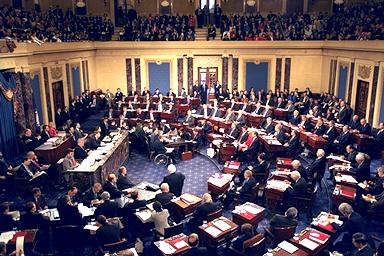| Home |
| Early Years |
| First Term |
| Second Term and Impeachment |
| Post-Presidency |
| Citations |
|
BILL CLINTON Second Term
In the 1996 presidential election, Clinton was re-elected, receiving 49.2 percent of the popular vote over Republican Bob Dole (40.7 percent of the popular vote) and Reform candidate Ross Perot (8.4 percent of the popular vote), becoming the first Democratic incumbent since Lyndon Johnson to be elected to a second term and the first Democrat since Franklin Roosevelt to be elected President more than once. The Republicans lost a few seats in the House and gained a few in the Senate, but retained control of both houses of the 105th United States Congress. Clinton received 379, or over 70 percent of the Electoral College votes, with Dole receiving 159 electoral votes. In the January 1997 State of the Union address, Clinton proposed a new initiative to provide coverage to up to five million children. Senators Ted Kennedy and Orrin Hatch teamed up with Hillary Rodham Clinton and her staff in 1997, and succeeded in passing legislation forming the State Children's Health Insurance Program (SCHIP), the largest (successful) health care reform in the years of the Clinton Presidency. That year, Hillary Clinton shepherded through Congress the Adoption and Safe Families Act and two years later she succeeded in helping pass the Foster Care Independence Act. He negotiated the passage of the Balanced Budget Act of 1997 by the Republican Congress. In October 1997, he announced he was getting hearing aids, due to hearing loss attributed to his age, and his time spent as a musician in his youth.
Impeachment In a lame-duck session of Congress after the 1998 elections, the House voted to impeach Clinton, based on the results of the Lewinsky scandal. This made Clinton only the second U.S. president to be impeached (the first being Andrew Johnson). Impeachment proceedings were based on allegations that Clinton had lied about his relationship with 22-year-old White House intern Monica Lewinsky in a sworn deposition in the Paula Jones lawsuit. After the Starr Report was submitted to the House providing what it termed "substantial and credible information that President Clinton Committed Acts that May Constitute Grounds for an Impeachment", the House began impeachment hearings against Clinton before the mid-term elections. To hold impeachment proceedings, the Republican leadership called a lame-duck session in December 1998. While the House Judiciary Committee hearings ended in a straight party-line vote, there was lively debate on the House floor. The two charges passed in the House (largely with Republican support, but with a handful of Democratic votes as well) were for perjury and obstruction of justice. The perjury charge arose from Clinton's testimony about his relationship to Lewinsky during a sexual harassment lawsuit brought by former Arkansas state employee Paula Jones. The obstruction charge was based on his actions during the subsequent investigation of that testimony.
The Senate later voted to acquit Clinton on both charges. The Senate refused to meet to hold an impeachment trial before the end of the old term, so the trial was held over until the next Congress. Clinton was represented by Washington law firm Williams & Connolly. The Senate finished a twenty-one-day trial on February 12, 1999, with the vote of 55 Not Guilty/45 Guilty on the perjury charge and 50 Not Guilty/50 Guilty on the obstruction of justice charge. Both votes fell short of the Constitutional two-thirds majority requirement to convict and remove an officeholder. The final vote was generally along party lines, with no Democrats voting guilty, and only a handful of Republicans voting not guilty. Clinton controversially issued 141 pardons and 36 commutations on his last day in office on January 20, 2001. Most of the controversy surrounded Marc Rich and allegations that Hillary Clinton's brother, Hugh Rodham, accepted payments in return for influencing the president's decision-making regarding the pardons. Some of Clinton's pardons remain a point of controversy.
|

